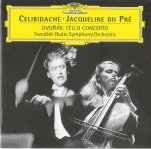This recording of Dvorak’s Cello Concerto was recorded live at the Stockholm Konserthus in the November, 1967. Almost from the outset the mood is set to be confrontational. Celibidache’s brooding, long-breathed, melancholic handling of the opening exposition deliberately sets the tone for what he clearly envisioned as a performance of high-flown seriousness. It’s what some might call remoteness, others possibly asceticism, but there’s still real warmth about the way the glorious second subject unfolds when first presented by the solo horn.
But Jacqueline Du Pré just wasn’t the artist to pair with Celibidache, and from her grating, furious first entry the tonal harshness and palpitating aggression in her playing rests uncomfortably beside the conductor’s highly refined scheme. This conflict of views means that where the first movement strives after aggrandisement, it loses it in the heat of the moment; and even the central andante brings real pathos only when the cellist manages to turn down the emotionalism of her playing. The finale is a tournament between two titans, whose sharply differentiated views of the music are constantly at odds. The effect overall is of a highly charged yet strangely unconvincing caricature of this great and noble work.
This same performance was recently re-issued by Teldec, where the Dvorak concerto is coupled with an altogether saner reading from Du Pré and Barenboim of Saint-Säens’ Cello Concerto No. 1 in A minor. Collectors wanting a classic interpretation of the Dvorak should look to Rostropovich and Karajan (the coupling is Tchaikovsky’s “Rococo” variations) now on Deutsche Grammophon’s The Originals label.
































